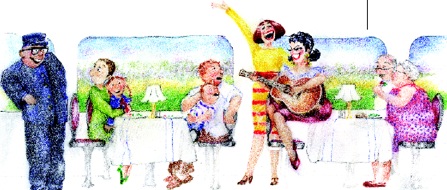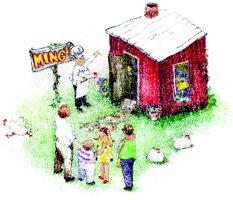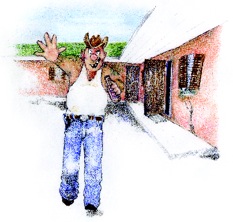Gone With The Road:
Confessions of a Montana Travel Writer
by Caroline PattersonIllustrations by Lindy Coon
 My mother, father, brother and I are on board a Great Northern passenger train, traveling from Missoula to Billings. We are traveling with country women with large purses, freckled children, porters with glistening black skin and strange accents. The railcars have dusty seats with adjustable footrests and backrests; the bathrooms have tiny sinks; and the railcars are permeated by smells of dust and coffee and diesel. The year is 1962. I am six. The steady ricketa-ricketa of the wheels underscores everything like a dream.
My mother, father, brother and I are on board a Great Northern passenger train, traveling from Missoula to Billings. We are traveling with country women with large purses, freckled children, porters with glistening black skin and strange accents. The railcars have dusty seats with adjustable footrests and backrests; the bathrooms have tiny sinks; and the railcars are permeated by smells of dust and coffee and diesel. The year is 1962. I am six. The steady ricketa-ricketa of the wheels underscores everything like a dream.
We are having dinner when two women come into the dining car, loose-limbed and laughing. They sit down and order drinks. The woman I remember has hair an unnatural color of black and a red slash of lipstick. She carries a guitar. She strikes up a conversation with my father in a brash, mocking voice. My father answers her, his voice measured and amused. My mother, next to me, tenses.
The women talk in a slurring banter, saying whatever comes into their heads, then laugh uproariously. I have never seen adults, much less women, behave like this—and I can’t stop staring, even though my mother whispers to me to do just that. I don’t understand that these women are drunk and, because I can’t explain their behavior, I find their lack of restraint riveting. At any moment, I am sure they will unlock the mysterious world of adults.
Two men in dark blue railroad uniforms join them. One is wearing a conductor’s cap. I am mildly shocked that he, a conductor, an official, is with these women. They order drinks, the ring of their voices rising above uncomfortable murmur of the diners and the slicing sounds of plates being stacked.
The woman with the guitar shoves her chair back from the table. She looks out at the roomful of diners, defiant, and hits a chord on the guitar. “I hear ya knockin’ but ya can’t come in,” she sings in a loud, gravelly voice.
Her companions roar.
My father smiles into his napkin.
My mother pales.
I snicker, aware that I shouldn’t be laughing, and that awareness makes me giddy.
The conductor looks at the table, and she looks at him, their glances sidelong and slow. I don’t understand the nature of this look. I only know their eyes seem locked in some kind of strange kind of slow-motion game of looking and looking away.
Bang! The woman strikes a chord again, her voice slowing. She sings it again. The laughter grows huskier.
The train slows, the wheels screech against the brakes, the dishes jiggle on the table, and a voice announces a one-hour stop in Butte. Our friends rise. As they walk down the gauntlet of diners trying furiously not to stare, the women hold their heads high; the men are red-faced, their eyes on the floor.
We hear their voices grow fainter as they walk away from the train.
Forks scrape plates in the sudden quiet.
This was one of the first times that traveling in Montana became interesting to me. Instead of being stuck in a hot car with my brother, feeling carsick, and looking out at endless cattle, trees, and sky or hearing boring stories about fur trappers and Lewis and Clark, here was drama. Adults were misbehaving. Other adults were disapproving. And we were seeing something—I could tell from my parents’ reactions—we weren’t meant to see.
What I had encountered was the surprise of travel. Travel suddenly meant something risky and utterly unpredictable. This was the difference between travel and adventure.
I love to travel in Montana. I love the roads, mountains, rivers, forests, and plains. I love the impending drama of the coyote I saw one early morning, trotting along behind a newborn calf. The flocks of Canada geese feeding in wheat fields. The lone antelope perched on a hillside. I love the surprise of good pie in roadside cafes, the predictably huge steaks and foil-wrapped potatoes at supper clubs, the goofy small-town museums with mannequins in Victorian gowns, a brass Civil War lunch box with a half-eaten biscuit in it, and the skeleton with an arrow through the skull.
In forty-eight years, I have traversed the state by car, train, bicycle, and bus. In 1988, I started working as a travel writer and my beat was Montana’s towns, ghost towns, ski areas, lakes, and hot springs. I have covered recreation ranging from skiing to tree-walking. I have eaten in a Chinese restaurant built in a chicken coop and a cafe with refurbished car bodies as booths. I have stayed in chalets, cinderblock motels, $300-a-night cowboy condos with deck-side Jacuzzis, and at elegant to plain old run-down dude ranches. In bed-and-breakfast inns, I have consumed hundreds of chocolates placed on hundreds of beds banked with hundreds of pillows in rooms decorated with straw hats, kites, kimonos, wind socks, glass dolls, and teddy bears.
What I love about traveling Montana is encountering the surprise of travel again: the fabulous peach cobbler at a dude ranch high in the Rocky Mountain Front, the hot springs secreted away in the Tobacco Root Mountains, the Glasgow museum display of two-headed animals; the river guide on the Missouri with his motorized canoes, hearing aides, and his assistant, Alice, with the screechy laugh.
 I love the strangeness and recklessness of these isolated places. The town of Rudyard, with the sign that says Pop: 286 nice people and one old sorehead! Or the Drummond sign: Home of the Bullshippers. It is not just the goofiness of signs like that that I treasure. It is the fact that the townspeople who erected them couldn’t give a damn whether I think the signs are funny or not—they did and that was what mattered.
I love the strangeness and recklessness of these isolated places. The town of Rudyard, with the sign that says Pop: 286 nice people and one old sorehead! Or the Drummond sign: Home of the Bullshippers. It is not just the goofiness of signs like that that I treasure. It is the fact that the townspeople who erected them couldn’t give a damn whether I think the signs are funny or not—they did and that was what mattered.
Recently I read an essay of A. B. Guthrie’s in which he delights in introducing his New York editor to some characters near his Rocky Mountain Front cabin. Guthrie’s delight in the contrast between these people made me intensely nostalgic—and I realized that it was because, these days, those contrasts are not as vivid. They are not as vivid because we are not as isolated. No one would dream, for example, of asking an actor, as one local rancher reputedly asked Steve McQueen in the Chico Hot Springs’ back bar, “Well, Steve, what’s your line of work?” The only place that feels that isolated anymore is eastern Montana, and even in Glasgow you can get espresso.
When my husband, Fred, and I moved back to Montana in 1992, I realized things had changed when I was standing on a hiking trail near Whitefish, reading a sign, wearing sunglasses, when a woman approached me, peering at me in an odd way. I finally realized she was trying to figure out if I was “somebody.” I’ve seen that look again, in the Bitterroot Valley, in Whitefish, in Bozeman—the appraising, head-to-toe, Should-I know-you? look. It was not a look I grew up with.
This is fall out from our transition to a service economy. We have our eyes out for the people we are serving—the movie stars, the wealthy, and the retirees who have adopted our state as their playground. Were we a more interesting people when we made a living from our own labors?
In 1994 I finally convinced the magazine I worked for to let me cover the Miles City Bucking Horse Rodeo and Sale. The only problem with the assignment was that they approved the story, expenses paid, one week before the sale. Nearly 10,000 people descend on Miles City during Bucking Horse time, and there wasn’t a motel room to be found in a sixty-miles radius. Finally, a chamber of commerce person gave me the number of the Red Rock.
A week later, Fred and I drive into Miles City, past KATL radio and Herefords grazing next to K-Mart, and the dusky, historic bars—the Range Rider, the Log Cabin, the Montana Bar—and a sea of people in cowboy hats and boots.
I stop to ask a woman for directions. She runs a hand through her hair and looks the two of us over, head to toe. I become self-conscious about my river sandals. “The Red Rocks,” she says. “I just can’t think of it.” I tell her it’s some old motel someone reopened. Her eyes widen and she says, “Ooooh shit.”
Down the road, we find the motel, marked with a busted-up neon sign with a pointy sheriff’s star and the words Red Rock SUPPER CLUB and POOL. The restaurant is a round building with a sign advertising Hickory Fried Chicken, but the windows are boarded, the sidewalk is cracked, and when I open the door, I see an empty pop machine and tumbleweeds and hear rats scuttling.
 We find the owner at a nearby secondhand store, a blue Quonset hut crammed with old beds, lamps, clothes, and ratty-haired dolls. She is in her fifties in a white straw cowboy hat with trebly florescent pink tassels. I’ll call her Irene. When I introduce myself, she looks at me and says, “Wait here.” Her voice is hushed with panic.
We find the owner at a nearby secondhand store, a blue Quonset hut crammed with old beds, lamps, clothes, and ratty-haired dolls. She is in her fifties in a white straw cowboy hat with trebly florescent pink tassels. I’ll call her Irene. When I introduce myself, she looks at me and says, “Wait here.” Her voice is hushed with panic.
We wander around the store, fingering moth-eaten sweaters and polyester pants, as men start carrying out furniture: a lamp, a bureau, a sofa bed, and a nightstand. “We’ll be just a minute!” Irene calls over with a little wave.
Half an hour later, we follow her truck across the broken pavement to a strip of flesh-colored motel rooms. As we stand behind, waiting for her to unlock our room, a man watches us from the doorway of the next room. He has a quart of Old Milwaukee, yardbird tattoos, and four teeth. “Lucky you,” he says in a stage whisper. “You’re in the room next to mine.”
That night, we stay out and drink as long as we can before we return. I pull the mattress off the tiny sofa bed and spread towels on it. I open the windows and try to ignore the musty smell of dust and disinfectant, discarded furniture, and discarded lives. The room to our right is tame: the twang of radios, the low rumble of a party. On the other side, the Kazam! Pow! and Hey Mr. Wizard! of a cartoon soundtrack plays at top volume all night long.
My husband sleeps with a pistol next to his pillow.
I didn’t even know he owned a pistol.
The next morning, as I’m brushing my teeth, I hear my neighbor’s loud, gut-churning vomiting from the bathroom next door.
“Was everything all right? Could we get you another mattress? Maybe a king size?” Irene says as I pay her $60 for the night. It is robbery, I know, but I just want to get out of there. “Look on the bright side,” our friend Bryan said later. “At least there was no hurl on the pictures.”
When I get home, there’s a card from Irene. “May you be blessed,” she writes in a loopy, slanting hand. “Thank you so much, for staying with me (so primitive and inadequate). You’ll never know how you blessed me! Red Rock Village is an entire story in itself...yet I have a vision for it.”
A year later, I got an assignment to visit an executive retreat. Tucked high in the mountains, the place was High Western Chic, with a log lodge bright with strings of lights, small log guest cabins with Jacuzzis, two-person showers, and that ugly, peeled-log furniture that looks like it was built by a three-year-old.
When my husband and I pull up to the office in our beat-up Subaru, the owners are plainly suspicious. Who am I writing for? they ask. What is the name of my editor? The phone number? They call my editor, and when the story checks out, they relax a bit but continue showing me the better publications that had run stories about them.
This is the first time in my travels around the state that being from Montana is not only distasteful; it is an outright mark against me. I’m suspect because I am local. These people feel that they need to protect their property and their guests from us.
Our entire visit is colored by their distrust: the moonlight soak in the Jacuzzi, the horseback ride through the snow, through mountains whose history I knew better than they, our dinner—the veal scalloppini and special vintage red wine—in the dining room decorated with a stone fireplace and elk hides with prominent plaques announcing the animals were shot on Ted Turner’s ranch.
While eating dinner, we start talking with the only other couple there. They are from New York—he has something to do with Saint Patrick’s Cathedral and she runs mountain inns—and in the course of our conversation, we realize that we have mutual Stanford connections. They buy us a drink. We buy them a drink. She invites us to their inn. We invite them to stop by our house. The proprietors look on, confused.
Emblematic of that visit was the glass cowboy boot. It sat on a table, two feet tall, and held dried flowers. This classic western image cast in glass embodied for me the pretentiousness of places like this, where the West I knew and loved was suddenly a party decoration. I despised the sham, the shameless appropriation of a culture, the shameless trafficking in images—cowboy hats and boots and horses—that were rendered bloodless, sterilized, fragile, safe, and stupid. I despised the fact that this culture was suddenly for sale to the highest bidder.
Why are we exporting experiences like this: experiences that are anxious approximations of the West? Places like this are anxious because they do not offer authenticity. They offer pre-digested experience, a kind of Ensure for the meek. They have interior decorators because they have no character.
What I love in Montana is character that emerges and is shaped by a place. It is character that is shaped in isolation. It is character—like the Red Rock or the grand, strange lobby of East Glacier with its twenty-two Doug fir columns, or the ambling main lodge at Chico—that is genuine. Character, good or bad, rescues us from blandness, mediocrity, and pretense.
While the Jacuzzi and veal scalloppini were nicer than the musty room at the Red Rock, it is, in the end, the Red Rock I tell stories about. Nice, after all, is not memorable.
 Former Montanan editor, Caroline Patterson has written travel pieces for Sunset magazine since 1988 and is currently an editor for Farcountry Press. She has published fiction and nonfiction in journals including Seventeen, Southwest Review, and Epoch. She lives with her husband, Fred, and two children in Missoula.
Former Montanan editor, Caroline Patterson has written travel pieces for Sunset magazine since 1988 and is currently an editor for Farcountry Press. She has published fiction and nonfiction in journals including Seventeen, Southwest Review, and Epoch. She lives with her husband, Fred, and two children in Missoula.